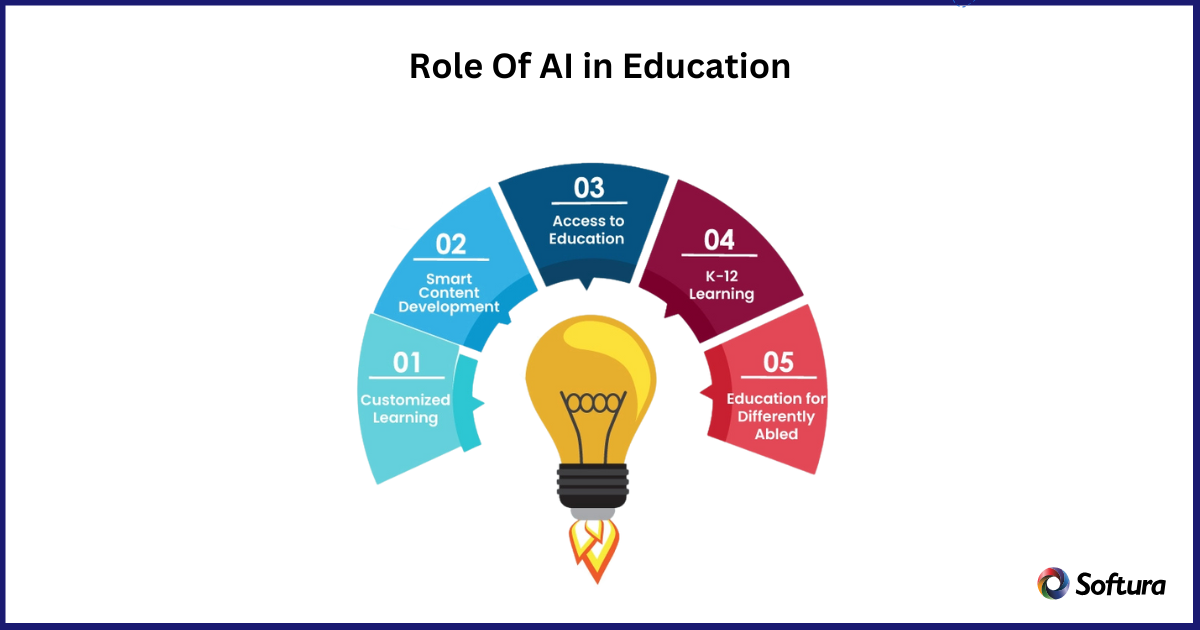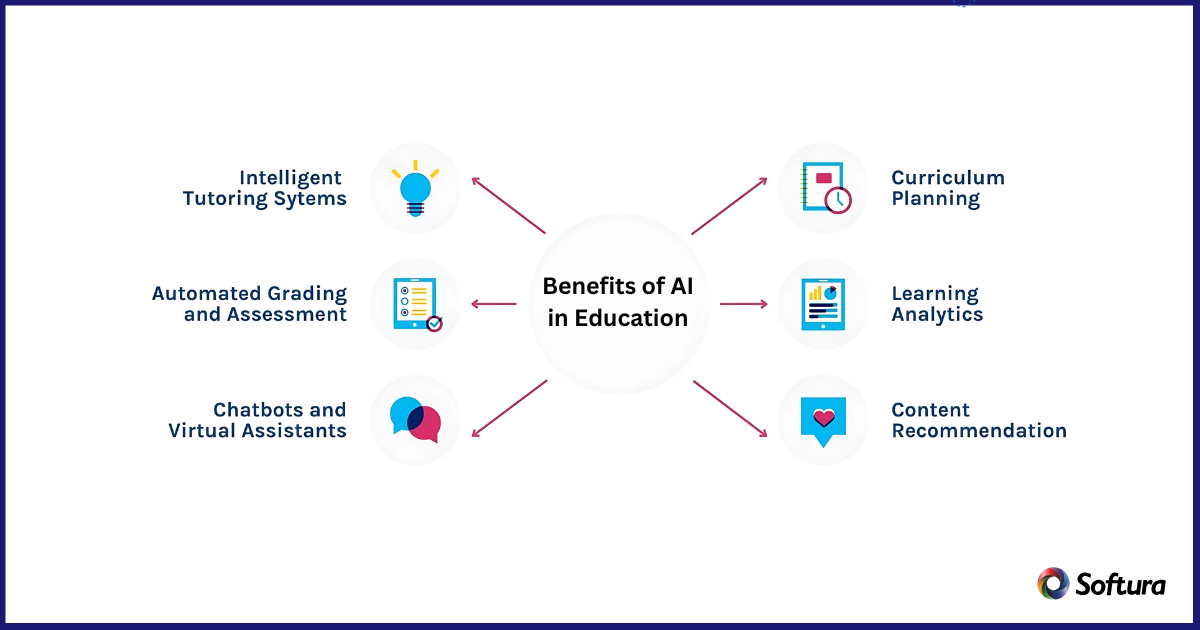"Our integration with the Google Nest smart thermostats through Aidoo Pro represents an unprecedented leap forward for our industry."
- Antonio Mediato, founder and CEO of Airzone.
In recent years, artificial intelligence (AI) has taken the world by storm, transforming industries from healthcare to finance. Now, it's making significant strides in education. AI is revolutionizing the way students learn, educators teach, and institutions operate. But what exactly is artificial intelligence in education, and why should it matter to schools, colleges, and universities?
In this post, we'll explore how AI development is reshaping the education sector, its benefits, use cases, costs, and what the future holds.
"Our integration with the Google Nest smart thermostats through Aidoo Pro represents an unprecedented leap forward for our industry."
- Antonio Mediato, founder and CEO of Airzone.
The role of artificial intelligence in education is no longer limited to futuristic visions—it’s a reality today. AI is helping educators personalize learning experiences, automate administrative tasks, and improve the overall quality of education. From chatbots assisting students to adaptive learning platforms that tailor content to individual needs, AI is everywhere.
As Sundar Pichai, CEO of Google, said:
"AI is one of the most important things humanity is working on. It is more profound than, I dunno, electricity or fire." This quote highlights the significant impact AI is having on various fields, including education.

"By analyzing the data from our connected lights, devices and systems, our goal is to create additional value for our customers through data-enabled services that unlock new capabilities and experiences."
- Harsh Chitale, leader of Philips Lighting’s Professional Business.
Onboard dedicated Offshore App Developers
Develop Mobile application and integrate it into your business processes with Softura's dedicated offshore mobile app developers!
The integration of artificial intelligence in education offers numerous benefits, from personalized learning to administrative efficiency. Here are the key advantages:
Personalized Learning: AI enables customized learning experiences, adapting to a student’s pace and style of learning. Tools like DreamBox and Knewton use AI to assess how students are progressing and offer personalized lessons to fit their learning curves.
Automation of Administrative Tasks: Tasks like grading, attendance tracking, and scheduling can be automated using AI, freeing up educators to focus on teaching and mentoring students.
Data-Driven Insights: AI can analyze vast amounts of data to provide insights into student performance and areas where they may need help.
Civitas Learning offer real-time data analytics to improve student success rates.
Enhanced Accessibility: AI-powered tools like speech-to-text and natural language processing help students with disabilities, making education more inclusive.

"By analyzing the data from our connected lights, devices and systems, our goal is to create additional value for our customers through data-enabled services that unlock new capabilities and experiences."
- Harsh Chitale, leader of Philips Lighting’s Professional Business.
Let’s dive into some practical applications of artificial intelligence in education that are making a real difference:
"By analyzing the data from our connected lights, devices and systems, our goal is to create additional value for our customers through data-enabled services that unlock new capabilities and experiences."
- Harsh Chitale, leader of Philips Lighting’s Professional Business.
One of the most significant transformations brought by artificial intelligence in education is personalized learning. In traditional classrooms, it's challenging to cater to the individual needs of each student, but AI bridges that gap.
AI tools like Smart Sparrow or Coursera's adaptive learning technology allow teachers to offer customized lessons that evolve based on a student’s performance. For instance, if a student is struggling with a particular math concept, the AI platform will provide extra exercises and explanations tailored to their needs.
A real-world example can be found in Georgia State University, which used AI-powered analytics to identify struggling students. By intervening early, the university was able to significantly improve student retention rates.
AI tutors are becoming more popular, especially in areas where one-on-one interaction is essential but human resources are limited. AI-driven platforms like Mika (an AI tutor for math) and Third Space Learning (which uses AI to improve tutoring in mathematics) provide affordable, scalable solutions to personalized tutoring.
In addition, AI-driven virtual assistants like Jill Watson, developed by Georgia Tech, are being used to assist with teaching tasks, such as answering frequently asked questions, grading assignments, and even holding office hours
A lot of valuable time in the education system is spent on administrative tasks—grading, attendance tracking, and answering basic student queries. Artificial intelligence in education is making these tasks more efficient through automation.
For example, Gradescope, an AI-powered grading platform, helps teachers grade exams and homework quickly. Similarly, TeacherBot can help teachers by automating routine administrative tasks like organizing lesson plans or answering repetitive questions from students.
This automation not only increases efficiency but also frees up educators to focus on teaching and interacting with students on a deeper level.
Implementing artificial intelligence in education doesn’t come without costs. While AI tools can eventually save money by reducing human labor and improving efficiency, the initial investment can be substantial.
Costs depend on the scale of the AI deployment:
Development Costs: If an institution chooses to develop custom AI solutions, the cost can range anywhere from tens of thousands to millions of dollars, depending on the complexity and scope.
Subscription Models: Many AI platforms offer subscription-based pricing. For instance, platforms like Knewton or DreamBox offer scalable pricing models, which may start at a few thousand dollars per year depending on the number of students.
Training and Maintenance: AI systems require ongoing training for educators and maintenance costs to ensure the system continues to work efficiently and evolves with changing needs.
While the benefits of AI are numerous, there are also challenges to consider when implementing artificial intelligence in education:

The future of artificial intelligence in education is incredibly promising. As AI technology continues to evolve, we’ll likely see even more sophisticated tools that can adapt to individual students' needs in real-time. Imagine virtual teachers powered by AI, capable of providing 24/7 personalized support, or AI systems that predict which learning methods work best for each student before a course even begins.
According to Bill Gates,
Technology is just a tool. In terms of getting the kids working together and motivating them, the teacher is the most important.
This suggests that while AI will play a larger role in education, it will complement, not replace, the crucial human element of teaching.
The integration of artificial intelligence in education is rapidly changing how we learn, teach, and manage educational systems. From personalized learning experiences to administrative efficiency, AI development services offers tools that can make education more effective and accessible for all students.
While there are challenges, the benefits far outweigh the concerns. By embracing AI, educators can not only improve student outcomes but also make learning more engaging, personalized, and inclusive. The future of education is undoubtedly intertwined with AI, and it’s an exciting time for educators, students, and institutions alike.
"Our integration with the Google Nest smart thermostats through Aidoo Pro represents an unprecedented leap forward for our industry."
- Antonio Mediato, founder and CEO of Airzone.
Are you ready for your next project?
Unlock your company's full potential with our comprehensive Software development services. Contact our experts today to discuss how we can drive your success together.